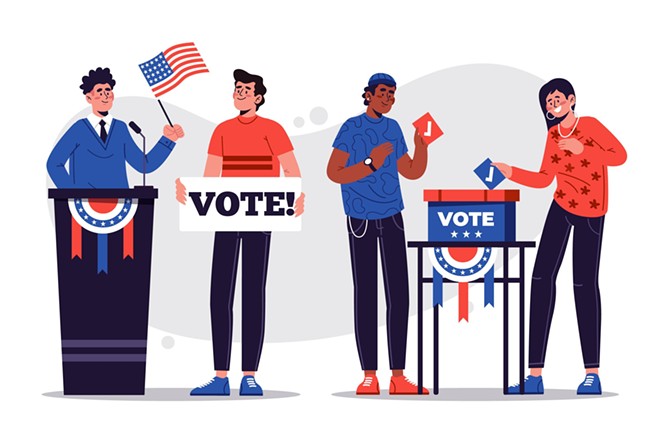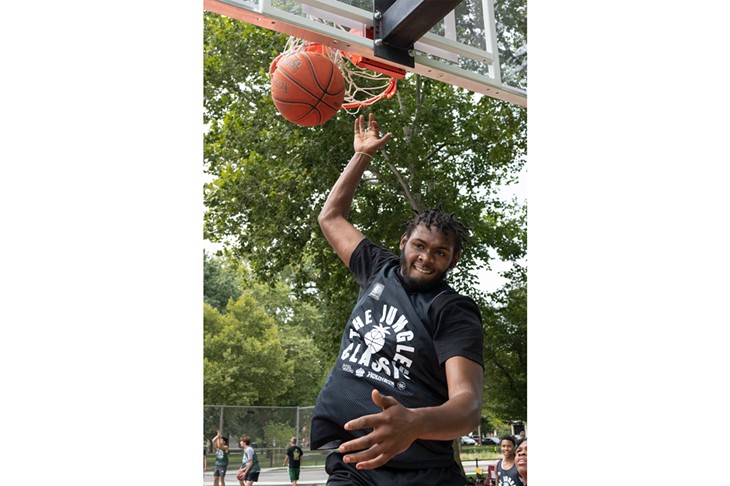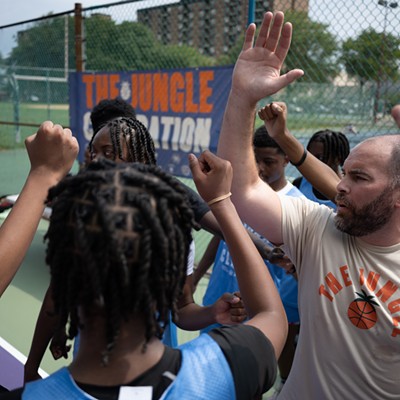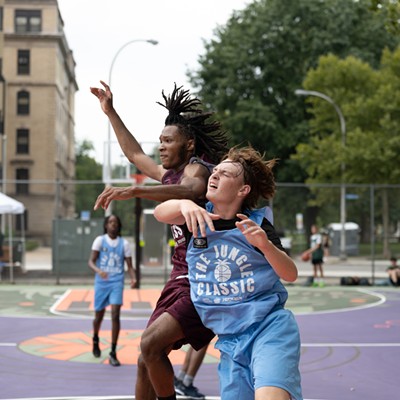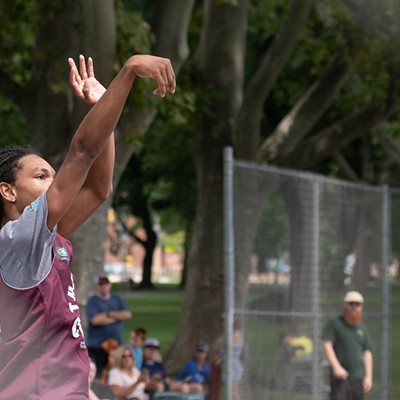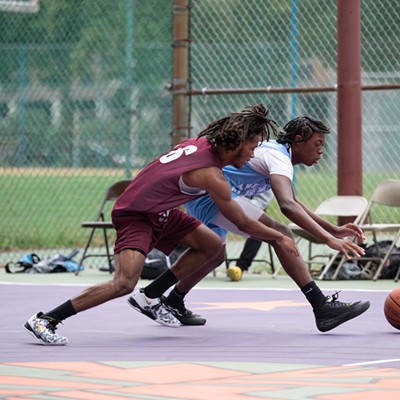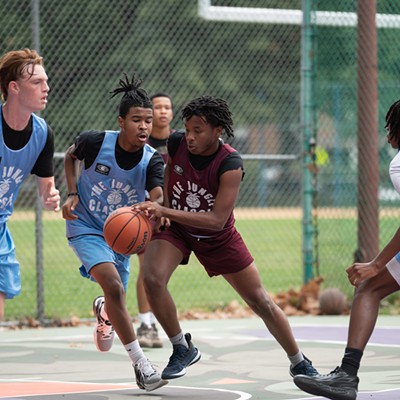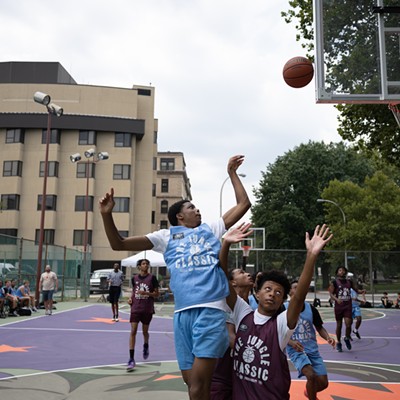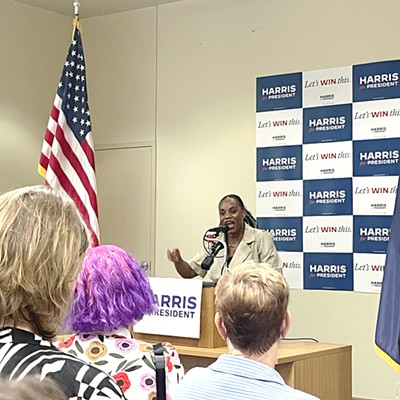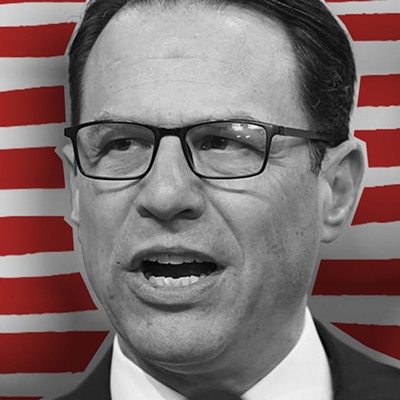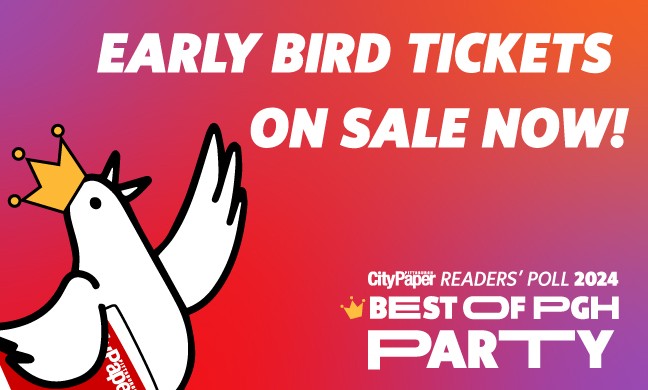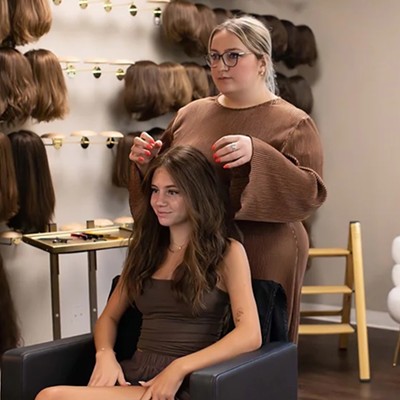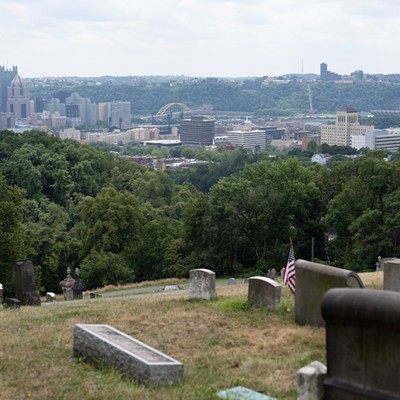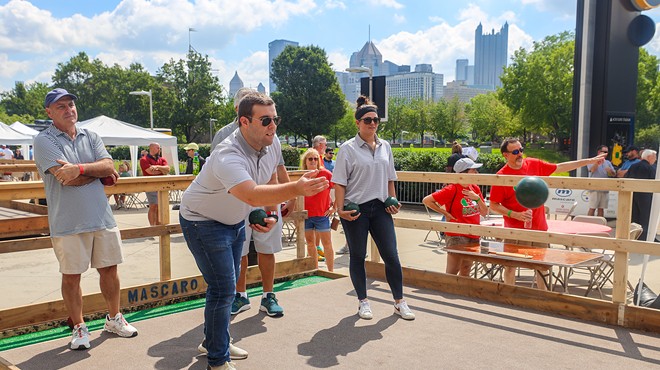Essay: Even before voting age, we young people can impact our democracy
[
{
"name": "Local Action Unit",
"component": "24929589",
"insertPoint": "3",
"requiredCountToDisplay": "1"
}
]
As a 15-year-old who reads the news (yes, we do exist), the recurring headlines are frustrating: another supreme court ethical lapse, melting glaciers in Greenland, and the latest death count in Gaza. When I see the news, I see huge problems, smaller solutions, and a slow-working democracy. But we are a democracy, and voting is how most Americans make the change they want to see — excluding me.
I am frequently told that youth are the future, a phrase that can be confusing, albeit true. I am the future, yet I do not have a vote to change the present. I could easily spend the next three years watching the world from my juvenile pedestal before making my voice heard. Instead, I began my journey of civic engagement as a freshman in high school.
In the Spring of 2023, I became involved with a local district magistrate candidate, Philip Roberts. I had seen signs for this election all over my neighborhood, yet I never bothered to ask about the race. In fact, I did not even know what a magistrate was. After researching the position, I discovered that district magistrates play a vital role in criminal proceedings and in truancy cases. The latter is most important to me as a Pittsburgh Public School student — one third of K-12 PPS students are considered “chronically absent,” according to the 2023 Report to the Community on Public School Progress in Pittsburgh. These students have missed at least 10% of school days, a number that can quickly snowball into a truancy case in Pennsylvania. To attend their truancy case, students miss school, parents miss work, and they can be fined hundreds of dollars.
Due to the counterproductive nature of missing school to attend a truancy case, I decided to dedicate my afternoons to canvassing for a candidate that prioritized more accessible truancy proceedings. My door-knocking journey began at 14. As a high school freshman, it was hard to imagine that adults would take voting advice from me. Why would they let a child influence their democratic decisions?
Despite my original concerns (and a few scary dog run-ins), canvassing was an inspiring and impactful experience. I learned to utilize my position as a high school student to convey the needs of students and show that my candidate was taking steps to fix issues that mattered to me. I found joy in advocating for an issue that I am passionate about, and I found that adults cared about issues that affect teenagers.
Sharing my voice was gratifying, but what about the voices of other students? In Allegheny County, 28.9% of 18-year-olds are registered to vote, according to the Civics Center. The number of 18-year-olds who exercise their right to vote is considerably lower than the registration rate, meaning that the vast majority are not actively engaged in our democracy.
When I began looking around, I found numerous groups and organizations informing and amplifying the youth vote, including PA Youth Vote, the Civics Center, and the League of Women Voters. At school, I began to hold voter drives and register my peers. Outside of school, I organized and participated in city-wide events to promote youth civic engagement.
During discussions at these civic events, I sensed a general feeling of mistrust towards the government from teenagers. While I acknowledge this viewpoint — and see it manifesting on college campuses and on the front pages of newspapers — it is important for young voters to continue turning up at the polls and advocating for their younger peers. After all, elected officials have tremendous control over policies important to students. Voting, and voting in large numbers, is a way to tell these officials what matters most to young people.
Working with local candidates is also an effective way to support your issues and get your voice heard. My experience working with my local magistrate candidate was impactful not only because I worked alongside them and learned about the position, but because my candidate started listening to my perspective on issues.
My experience underlines that civic engagement does not have an age requirement. Everyone, at any age, can educate themselves and others about important issues by building relationships and having conversations with their peers and family. Throughout the process of campaigning for a candidate, encouraging my peers to register to vote, and learning how to plan engaging student events, I have learned that, as a 15-year-old, I can have an impact on my community and the decisions it makes. While taking my experiences into account, I encourage youth in particular to stand on the front lines of democracy for the 2024 presidential election. Get involved with campaigns, discuss pressing issues, and encourage your peers to register and vote. Now more than ever, it is important for all youth to make their voices heard.
Orli Trumbull is currently a Junior at Obama Academy, Pittsburgh Public Schools.
I am frequently told that youth are the future, a phrase that can be confusing, albeit true. I am the future, yet I do not have a vote to change the present. I could easily spend the next three years watching the world from my juvenile pedestal before making my voice heard. Instead, I began my journey of civic engagement as a freshman in high school.
In the Spring of 2023, I became involved with a local district magistrate candidate, Philip Roberts. I had seen signs for this election all over my neighborhood, yet I never bothered to ask about the race. In fact, I did not even know what a magistrate was. After researching the position, I discovered that district magistrates play a vital role in criminal proceedings and in truancy cases. The latter is most important to me as a Pittsburgh Public School student — one third of K-12 PPS students are considered “chronically absent,” according to the 2023 Report to the Community on Public School Progress in Pittsburgh. These students have missed at least 10% of school days, a number that can quickly snowball into a truancy case in Pennsylvania. To attend their truancy case, students miss school, parents miss work, and they can be fined hundreds of dollars.
Due to the counterproductive nature of missing school to attend a truancy case, I decided to dedicate my afternoons to canvassing for a candidate that prioritized more accessible truancy proceedings. My door-knocking journey began at 14. As a high school freshman, it was hard to imagine that adults would take voting advice from me. Why would they let a child influence their democratic decisions?
Despite my original concerns (and a few scary dog run-ins), canvassing was an inspiring and impactful experience. I learned to utilize my position as a high school student to convey the needs of students and show that my candidate was taking steps to fix issues that mattered to me. I found joy in advocating for an issue that I am passionate about, and I found that adults cared about issues that affect teenagers.
Sharing my voice was gratifying, but what about the voices of other students? In Allegheny County, 28.9% of 18-year-olds are registered to vote, according to the Civics Center. The number of 18-year-olds who exercise their right to vote is considerably lower than the registration rate, meaning that the vast majority are not actively engaged in our democracy.
When I began looking around, I found numerous groups and organizations informing and amplifying the youth vote, including PA Youth Vote, the Civics Center, and the League of Women Voters. At school, I began to hold voter drives and register my peers. Outside of school, I organized and participated in city-wide events to promote youth civic engagement.
During discussions at these civic events, I sensed a general feeling of mistrust towards the government from teenagers. While I acknowledge this viewpoint — and see it manifesting on college campuses and on the front pages of newspapers — it is important for young voters to continue turning up at the polls and advocating for their younger peers. After all, elected officials have tremendous control over policies important to students. Voting, and voting in large numbers, is a way to tell these officials what matters most to young people.
Working with local candidates is also an effective way to support your issues and get your voice heard. My experience working with my local magistrate candidate was impactful not only because I worked alongside them and learned about the position, but because my candidate started listening to my perspective on issues.
My experience underlines that civic engagement does not have an age requirement. Everyone, at any age, can educate themselves and others about important issues by building relationships and having conversations with their peers and family. Throughout the process of campaigning for a candidate, encouraging my peers to register to vote, and learning how to plan engaging student events, I have learned that, as a 15-year-old, I can have an impact on my community and the decisions it makes. While taking my experiences into account, I encourage youth in particular to stand on the front lines of democracy for the 2024 presidential election. Get involved with campaigns, discuss pressing issues, and encourage your peers to register and vote. Now more than ever, it is important for all youth to make their voices heard.
Orli Trumbull is currently a Junior at Obama Academy, Pittsburgh Public Schools.

